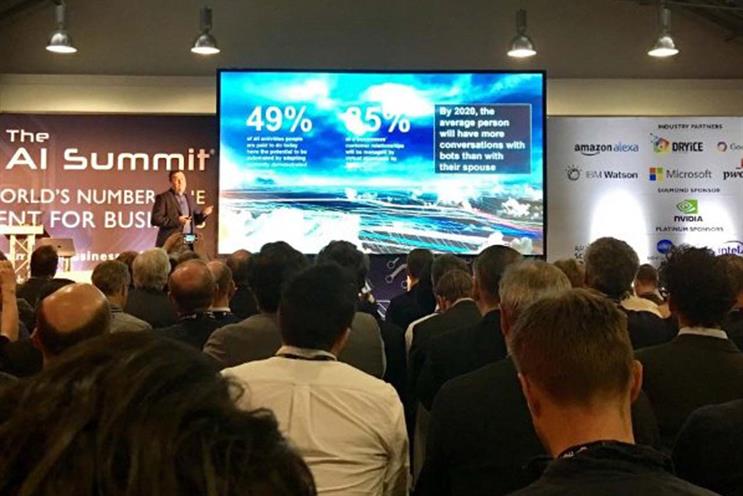A year ago, the AI Summit hosted its inaugural conference in London at the Four Seasons. The event focused on the role of AI in the business world, but the roughly 400 attendees were mostly technologists and vendors seeking to sell their products.
This year, however, you wouldn’t be blamed for not recognising the event. Hosted at the Business Design Centre in London, it had over 1500 attendees spanning more than 70% of the FTSE 100. Most of them were focused on real-world applications of artificial intelligence and many were C-level executives from within their organisations.
Roughly 40 companies including Lloyds, BBC, The London Stock Exchange, Tesco, Airbus, and BT presented overviews of what they have learned in their efforts to transform their businesses with artificial intelligence. Microsoft, Google, IBM and Amazon and the leading service providers including PWC and SapientRazorfish also provided insight into the future of AI.
Throughout these discussions, there were a few consistent themes:
AI will augment people – not replace them
The term "augmented intelligence" was used frequently and highlighted the learnings of many large companies. They consistently found that where they had tried to completely replace people, their efforts had often been met with failure. In solutions where they deployed technologies that focused on making people more productive, they had a much higher rate of success.
McKinsey has projected that 49% of the activities that workers are paid to do today can be automated with existing technologies, however less than 5% of jobs could be fully automated. So, while some fear AI will replace people, it will actually make their lives much easier – and ultimately contribute to the success of the business.
Chatbots drive results (if designed properly)
There was a general acceptance that virtual assistants (currently in the form of chatbots) are becoming progressively more advanced and will transform the way that companies connect with their customers.
Gartner Group projects that by 2020, virtual assistants will manage 85% of a businesses’ customer relationships, and perhaps more tellingly, that the average person will have more conversations with bots than they do with their spouse.
The question wasn't around whether leading companies are implementing chatbot solutions, but rather how – and what the impact has been to date. While we can now hail an Uber using a chatbot within Facebook Messenger, digital health apps are using bots to connect users with doctors and Pizza Hut now enables customers to make orders via a Twitter-bot.
In addition to creating more effective customer services, AI is often commonly used for internal management improvements within organisations. In a world so encapsulated by bots, it's evident that experience design is critical to these solutions both in the form of the interface design, but also in the way that conversations are managed.
AI is much more than just chatbots
While there is no denying that chatbots and virtual assistants will transform businesses, they are only one part of what AI can do. Machine learning and deep learning can be applied to current business problems to generate new insights as well as to optimise business expenditures.
Two additional types of AI tools that are worth exploring now are natural language understanding and vision. For example, Google is using its own machine learning technology to reduce the cooling costs for its data centre by as much as 40%. And, a Fortune 500 firm has been able to reduce the costs associated with their contact centres by as much as 10% via application of natural language understanding technologies that help them quickly identify what people are calling to discuss and optimally routing their calls.
These developments are helping market leaders better understand and predict customer behaviours, thereby resulting in higher profit margins.
Focus on creating value
Marc Lien of Lloyds Banking Group very succinctly described their focus on "proof of value" projects rather than "proof of concept" projects. Many case studies at the AI Summit highlighted measurable results, such as cost reductions or increased conversion rates.
In fact, the "AIconic" awards, one of the only independently judged AI awards, clearly had a preference towards firms that demonstrated the ability to move the needle and contribute to the bottom line.
Winners included IPSoft, which won Best Intelligent Assistant Innovation, and has helped many firms deploy virtual assistant solutions that create more cost-effective revenue streams. Another winner, for Best Application of AI in the Enterprise, was Luminoso, which helps brands generate real insights based on what their customers are saying, as well as drive the cost out of functions like call centres with advanced natural language understanding technologies.
As this week proved, there’s a lot of truth behind the hype when it comes to AI and many of the largest companies in the world are creating meaningful real-world results.
AI isn’t something to be feared and certainly isn't all doom and gloom. The real winners will be those organisations that continue to embrace AI, and use it to transform the way that they run their businesses and importantly, generate value for their customers.
Josh Sutton is data and artificial intelligence lead at SapientRazorfish.


